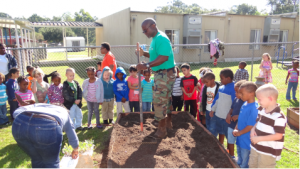
Research shows that gardening in school and clubs positively influences youth environmental attitudes, nutritional attitudes, self-esteem, test scores, school attitudes, interpersonal skills, social concerns and behavior. For example, students in third and fifth-grade who learn science through gardening scored higher than students who did not learn science through the use of a garden (National Gardening Association, 2002). The first step is helping your club or class select a garden style. The three most common types of gardens are raised-beds, container, and your typical in-ground garden. This article will provide some tips in helping you decide what type garden is perfect for your 4-H Club or 4-H Classroom.
Container Gardens– Container gardens are extremely kid-friendly and are an excellent choice if you have little space, poor soil, or are surrounded by cement and blacktop. Even the smallest outdoor nook can feature a thriving crop of vegetables, herbs, and flowers in containers.
Benefits of Container Gardening Include:
- Maximizing your space. You can take advantage of small areas like sunny window ledges and courtyards.
- Testing the waters. You may want to make sure gardening will work well with your club before committing lots of resources.
- Portability. If you are faced with challenges — vandalism and theft, or upcoming construction that will displace your plots — you can design container gardens that can be easily moved on a daily or seasonal basis.
- Soil control. By using containers, you can be confident about the safety of your growing media and enjoy eating your harvest. This is a concern where soil may be contaminated with lead or other industrial pollutants.
- Blacktop greening. Perhaps you are in an area void of soil and green space. You can place containers on concrete or cement surfaces.
- Deer, rabbits, and other wildlife are less likely to dine on plants in your container garden.
- Keep in mind though, that bigger is often better. The bigger your container, the more soil it will hold. In container gardening, more soil means better water retention, which means you have more latitude with watering and that usually increases your chances of success.

Raised-bed Gardens– A raised bed garden is built from wood or plastic boards, typically four feet wide and as long as desired (four-feet-by-four feet for square foot gardening, up to 14 feet long rectangular beds). Because much of Florida soil is sandy and does not hold many nutrients, the deeper the garden beds, the better the soil will be. Many schools stack two boards on top of one another to achieve a 10 to 12-inch high garden bed, using 18-inch wooden stakes to keep the boards together. Potting mix, compost or garden sand from the site itself are added to fill the boxes, leaving two inches from the top as clearance. Raised beds help prevent kids from walking on delicate plant roots, clearly marks the boundaries of the bed and reduces some soil-borne pest problems. Clubs in urban areas have constructed raised beds directly on asphalt or concrete surfaces with successful results.
Benefits of Raised-Bed Gardening include:
- More control over the location of the garden
- Ability to choose the best soil for your particular plants
- More efficient draining
- Can be easier on backs and knees due to less bending and stooping
- Easier to keep out weeds
- The soil warms up earlier in a raised bed, so you can plant earlier and extend your growing season

In-Ground Gardens– Vegetables, fruit trees, and flowerbeds (such as butterfly gardens) can all grow directly in the ground, as farmers have for centuries. Gardens can be as small as four-feet-by-four-feet, or as large as the garden committee is willing to implement. Before planning a garden, dig several holes at the proposed site to collect soil samples for a pH test and to determine the soil type. Your local County Extension Office can test the soil. Most plants grow best with a pH of seven, but some have different pH requirements. Low-lying or seasonally moist areas will require different plants than high, dry, sunny areas with sandy soil.
Benefits of In-Ground Gardening Include:
- Use of existing soil. Most soils are perfectly fine for gardening, provided the soil is properly tilled, mulched and watered. Even without organic amendments, most soils can produce a bountiful harvest.
- Less start-up work (and cost). A flat, well-drained area can be quickly and easily prepared with a large rotor-tiller. You can also save on soil and bed or container materials.
- An in-ground garden can easily be replaced by another crop or moved to another location.
- Lower water requirements. In-ground beds won’t dry out as quickly as raised beds and will, therefore, require less water to maintain.
- Irrigation systems for flat, in-ground gardens are simple to design and easy to install compared to raise beds that require careful design and installation.
If you have a green thumb, consider going “totally green” as a 4-H gardening volunteer! 4-H needs caring adults like you to share their knowledge and passion for gardening with the next generation. Through the 4-H gardening project, youth not only learn gardening knowledge and skills, they also learn responsibility, teamwork, and other life skills that will help them grow up to be compassionate and competent citizens. To get involved, contact your local UF IFAS Extension Office, or visit http://florida4h.org./volunteers.
Your opinion matters! Please provide feedback on this short survey to help us improve our blog: https://ufl.qualtrics.com/SE/?SID=SV_3gtLKjqia3F75QN.
 0
0
